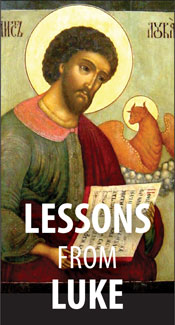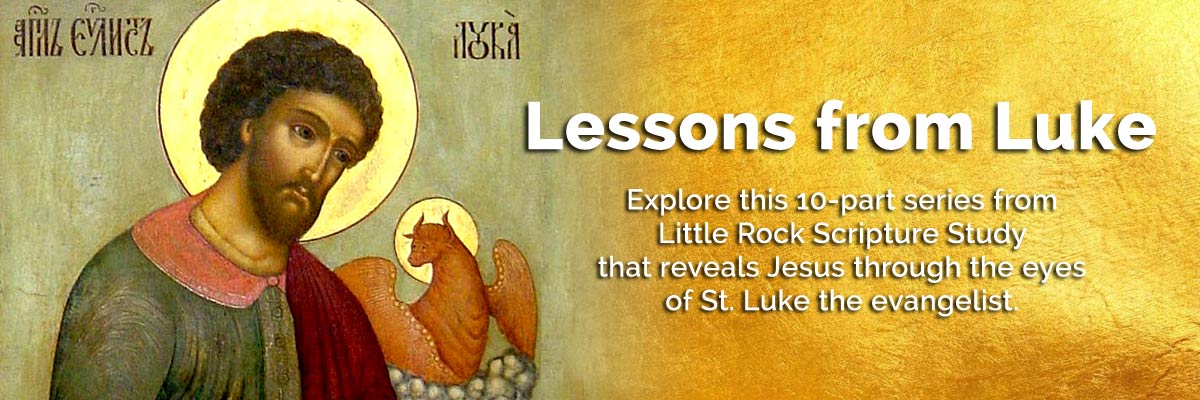Official Website of the
Catholic Diocese of Little Rock
The canticles acclaim God’s faithfulness
Published: May 11, 2019
This is the fourth column in a 10-part series.
By Cackie Upchurch
Director of Little Rock Scripture Study
The Gospel of Luke reveals in very short order that God’s reign is present in Jesus, and that Jesus is a friend of the poor. From the announcements of the birth of John and of Jesus, to the humble conditions of Jesus’ birth, and within the words of key figures in these scenes, we know without a doubt that Luke and his community experienced a profound shift when they came to know Jesus. Nothing tends to capture this quite so clearly as the canticles found in Luke.
From the announcements of the birth of John and of Jesus, to the humble conditions of Jesus’ birth, and within the words of key figures in these scenes, we know without a doubt that Luke and his community experienced a profound shift when they came to know Jesus. Nothing tends to capture this quite so clearly as the canticles found in Luke.
“Canticle” is derived from the Latin, “canticulum,” which means “little song.” Generally these are biblical texts, in addition to the psalms, that may be chanted or sung as hymns, and there are four of them found in Luke 1−2.
The Canticle of Mary (also known by its Latin name, the Magnificat) is found in Luke 1:46-55, “My soul proclaims the greatness of the Lord …”. It is perhaps the best known of the songs of praise found in Luke. Mary’s words, spoken as part of the visit with Elizabeth, give praise for God’s greatness exhibited in his care for her in her lowliness but also in God’s care for all who are lowly.
It celebrates that the proud of mind and heart are dispersed, unjust rulers are deposed, and the rich are sent away empty. The Magnificat is part of Liturgy of the Hours, particularly evening prayer, Vespers, and it reinforces that God’s kingdom is unlike anything that we have grown accustomed to. It reminds us to be willing to let go of our false assumptions.
The Canticle of Zechariah (in Latin, the Benedictus) is found in Luke 1:68-80. The carefully crafted words on the lips of the father of John the Baptist celebrate a Father’s gratitude for a long-awaited son, a son who will be “prophet of the Most High” and prepare the way for the Messiah. The Benedictus is a regular part of the morning prayer of the church known as Lauds. It reminds us that in every age we bless God who fulfills his promises of mercy.
The Angels’ Gloria (Luke 2:14) is a canticle of one powerful verse: “Glory to God in the highest and on earth peace to those on whom his favor rests.” The angelic hymn is sounded as lowly shepherds are told of Jesus’ birth with the simple words, “a savior has been born for you.” These words form the opening stanza of the Gloria we pray at Sunday Mass and for feasts and other special occasions. The joy is undeniable.
The Canticle of Simeon (the Nunc Dimittis in Latin) is perhaps least familiar of the canticles. This song finds its home in Luke 2:29-32 in the scene where Mary and Joseph enter the temple precincts to present their baby, Jesus, to the Lord. The young family encounters two elderly people, faithfully awaiting the fulfillment of God’s promised redemption of his people. The prophetess Anna’s prayerful preparation allowed her to recognize Jesus. And there was Simeon, whose faithfulness assured him that he would not die before seeing the Messiah. His words, “Now, Master, you may let your servant go in peace” proclaimed what he saw with his own eyes, the Messiah. The Nunc Dimittis is an essential element in the church’s night prayer known as Compline.
What do these “little songs” have in common? Praise, joy, and a firm affirmation of God’s faithfulness. While the Angels’ Gloria does not articulate God’s care for those who are outcast as do the other canticles, even there it is implied by reminding us of God’s favor. And we know God’s favor, God’s grace, freely given, does not dependent on our merit.
The three canticles used in the Liturgy of the Hours each have a deep resonance with the Old Testament. Look for the connections between the elderly parenthood of Zechariah and Elizabeth and that of Abraham and Sarah (Gen 15, 18, and 21), the thematic similarities between Mary’s song and that of Hannah (1 Sam 2:1-10), and the common theme of service to God found in the story of Simeon and of Samuel (1 Sam 3:1-18).
Praying these ancient canticles joins us to the past where we see God’s faithfulness, but it also points us to the future where God will continue to act on behalf of the poor.
Study Questions
- Are you familiar with the Liturgy of the Hours, the prayer that for centuries has been sung and spoken in monasteries across the globe? In more recent times, more and more lay people also pray with the Liturgy of the Hours. What value do you see in this type of prayerful ritual to mark various points in the day?
- The Magnificat (Luke 1:46-55) can be read as a description of the kingdom of God that Jesus proclaimed with his life. What are some of the features of God’s kingdom? And how is this echoed at the start of Jesus’ ministry (Luke 4:16-21)?
- What reminders do you keep in your heart to remind you of God’s faithfulness in your life or the lives of those you love?
- The word canticle is usually reserved for those prayers (easily sung or chanted) that are not contained in the book of Psalms. Take some time to sample some canticles found in other parts of Scripture: Three Youths in Daniel 3:74-87; Moses and Miriam in Exodus 15:1-21; Judith’s Deliverance in Judith 16:1-17; God’s People in Sirach 36:1-22.
This article was originally published in Arkansas Catholic May 11, 2019. Copyright Diocese of Little Rock. All rights reserved. This article may be copied or redistributed with acknowledgement and permission of the publisher.




